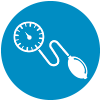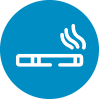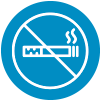When your dental hygienist reminds you to brush, floss, and rinse daily, it’s not just to protect the health
of your teeth. Poor oral hygiene allows harmful bacteria to grow in your mouth. These bacteria cause bad
breath, sore, inflamed gums (gingivitis), and tooth and bone loss (periodontitis). They also travel through
the bloodstream to other parts of your body. If these bacteria reach your heart, they can cause a serious
infection called endocarditis. Bacteria in the bloodstream can also contribute to clogged arteries, which
increase your risk for heart attack and stroke.
Signs of poor oral health
- Red, swollen or tender gums
- Bleeding gums while brushing or flossing
- Gums that are separating or receding from the teeth
- Bad breath or a bad taste in your mouth
- Infection, such as pus, in the gums
- Tooth decay
- Loose teeth
Whose heart health is at risk?

Individuals with advanced, chronic gingivitis or periodontitis

Individuals with diagnosed heart disease or a previous stroke

Individuals with high blood pressure, high cholesterol or who are obese

Smokers
What can you do?
1. Make healthy lifestyle choices

Avoid cigarettes and other tobacco products.

Eat a healthy diet rich in vitamins A, C, and D.

Exercise regularly.
2. Take steps to prevent gingivitis and periodontitis
While researchers have not found a direct connection between gum diseases and heart disease, studies
show that people with poor oral health have higher rates of heart problems and stroke. That increased
risk—even if it isn’t fully understood—is a good reason to develop a daily at-home oral care routine and
schedule regular preventive dental hygiene appointments.
 Brush twice a day for 2 minutes with a
soft toothbrush and fluoride toothpaste.
Don’t forget to reach the back and the
inside surfaces of the teeth, and along
the gumline.
Brush twice a day for 2 minutes with a
soft toothbrush and fluoride toothpaste.
Don’t forget to reach the back and the
inside surfaces of the teeth, and along
the gumline.
 Use a power toothbrush, if possible. It
removes more bacteria than a manual
toothbrush.
Use a power toothbrush, if possible. It
removes more bacteria than a manual
toothbrush.
 Clean between teeth daily with dental
floss, a floss aid or an interdental brush.
Clean between teeth daily with dental
floss, a floss aid or an interdental brush.
 Rinse your mouth daily with an
antibacterial solution. Use an alcohol-free
rinse if you have dry mouth.
Rinse your mouth daily with an
antibacterial solution. Use an alcohol-free
rinse if you have dry mouth.
 Keep brushing, cleaning between your
teeth, and rinsing daily even if your
gums bleed.
Keep brushing, cleaning between your
teeth, and rinsing daily even if your
gums bleed.
 Clean your tongue daily using a
toothbrush or a tongue scraper.
Clean your tongue daily using a
toothbrush or a tongue scraper.
 Visit your oral health professional
regularly and remember to tell them
about any health conditions and
medications you are taking.
Visit your oral health professional
regularly and remember to tell them
about any health conditions and
medications you are taking.
Your dental hygienist cares about your oral and heart health.
Now that’s something to smile about!